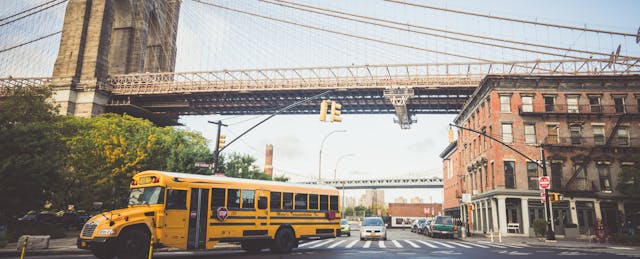Nationwide, teachers are nervous about getting back into the classroom, citing health and safety concerns as the COVID-19 pandemic stretches into a new school year. In August, one poll found that two-thirds of teachers thought that schools should be primarily remote this fall.
Depending on their district, some of those teachers may get their wish. And for those who aren’t so lucky, there’s always the courts.
That’s the thinking, anyway, behind a new lawsuit filed Sept. 1 on behalf of five New York City teachers, who are suing the country’s largest school district to give every teacher the right to work remotely if they choose.
The city’s department of education is already under fire from the local teacher’s union, the United Federation of Teachers, which is considering a possible strike if demands around safety equipment and procedures as well as testing for students and staff are not met. The city recently reached a deal with the union to delay the start of school by more than a week to focus on safety.
The new lawsuit isn’t sponsored by the union, though it was financed and organized by members of a subgroup, called the UFT Solidarity Caucus. (The UFT has not responded to a request for comment by EdSurge.)
“We all feel that, at this time, our schools are really not safe for kids and teachers and other educators,” says Lydia Howrilka, a high school teacher in New York who heads the Solidarity Caucus and helped prepare the suit. “Over the spring, we lost 75 educators and approximately 25 school safety agents, so we really do not feel happy or particularly comforted by the city’s reopening plan.”
Currently, the city is planning to open using a hybrid model, where some students learn entirely remotely while others come to school a few days a week and learn remotely the rest of the time. In that scenario, teams of teachers will work with individual groups of students. The city’s mayor, Bill de Blasio, has said schools will only open if its rate of positive cases is under 3 percent; as of now, it is about 1 percent.
Under the city’s guidelines, teachers can apply to work remotely if they meet certain criteria outlined by the Centers for Disease Control and Prevention that puts them at increased risk for complications if they catch COVID-19. The lawsuit, however, calls the medical accommodations “arbitrary and capricious,” noting that they do not take the health concerns of relatives into account—a major concern for some teachers.
“Teachers who do not qualify from a specific set guidelines of medical accommodations—if they do not fall under any of those categories, the only option they have is to take an unpaid leave,” Howrilka says. “We are being given a Hobson’s choice of choosing between either our paychecks and livelihood or our own health and safety.”
Many of the suit’s plaintiffs complain of older school buildings with poor ventilation, few functioning windows and bathrooms without hot water. Some are caring for elderly relatives or those with chronic health conditions; others have already lost family members to COVID-19.
Across the country, teachers and unions are fighting to keep schools closed and teachers at home. In Florida, the state’s largest union recently won its suit to give local districts more say in reopening plans. Previously, the state’s department of education had required in-person learning for all but a handful of large districts, and had threatened to withhold state funding from non-compliant districts. (The court’s decision has not gone into effect and is being appealed by the state.)
While researching the lawsuit, Howrilka and her team found a number of districts that were granting accommodations to teachers—similar to the ones the New York suit is seeking. Several districts in California and Washington State let teachers choose between teaching remotely or a hybrid approach when county COVID-19 cases become low enough to allow schools to reopen.
New Jersey’s Millburn-Short Hills district switched to all-remote after many of its teachers requested to work from home. Two districts in upstate New York, New Paltz Central and Wayne-Finger Lakes, are using hybrid models but offering teachers the option of working from home. And in Louisiana, East Baton Rouge Parish Schools will also let teachers work remotely if they provide a reason, such as caring for an elderly relative or young children.
However, the choice may be rare—or at least not often publicly disclosed. In a recent analysis of more than 300 school reopening plans conducted by EdSurge using data from the behavior analytics firm Social Context Labs, only a few districts—including Connecticut’s Farmington Public Schools, Montana’s Great Falls Public Schools and New Jersey’s Princeton Public Schools—appeared to support accommodating teachers who needed to work remotely. (Other districts may offer the option but not are sharing it in their publicly-released plans.)
Even though the New York lawsuit is aimed at letting teachers work remotely, or even pushing the city’s department of education into scrapping in-person learning altogether, Howrilka isn’t a fan of the remote model. Yet, she says, it’s what’s necessary now.
“Remote teaching is not ideal at all,” she says. “I really hate teaching from a screen, but I would much rather be kept healthy and know my kids are being kept healthy and safe.”


